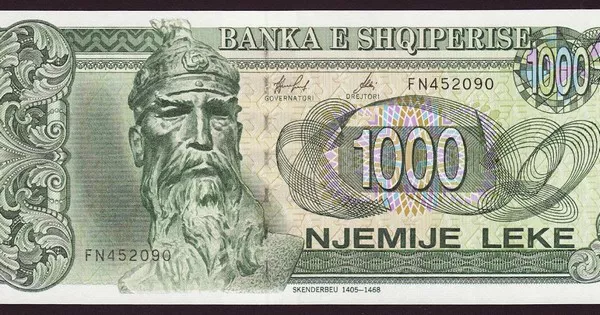The currency of a nation is not merely a medium of exchange; it is a reflection of its history, culture, and economic identity. Albania, a country nestled in the heart of Southeastern Europe, has its own distinctive currency known as the Lek. In this extensive exploration, we delve into the historical roots and etymology behind the Albanian currency, uncovering the reasons why Albanian currency is called the Lek. This journey through time will shed light on the cultural and economic underpinnings that have shaped Albania’s monetary nomenclature.
Historical Context:
To understand why the Albanian currency is called the Lek, it is crucial to explore the historical context in which it emerged. Albania, a nation with a rich tapestry of historical influences, gained independence in 1912. The need for a national currency became imperative as the country sought to establish its economic sovereignty. The choice of the name “Lek” was not arbitrary; rather, it was a deliberate decision to carve out a distinct identity for Albania’s monetary system.
Etymology of the Word “Lek”:
The term “Lek” has deep linguistic roots in the Albanian language, reflecting a connection to the country’s heritage. Linguists trace the word “Lek” back to the ancient Albanian language, spoken by the Illyrians, the indigenous people of the region. The Illyrians inhabited the territory that is now modern-day Albania, and their linguistic influence persists in the Albanian language. This linguistic connection serves as a testament to Albania’s commitment to preserving its cultural and historical legacy through its currency.
National Identity and Independence:
The naming of the currency holds symbolic significance, particularly in the context of Albania’s quest for national identity and independence. In the aftermath of centuries of foreign rule and influence, the adoption of the Lek as the national currency was a declaration of economic autonomy. The currency became a tangible representation of Albania’s newfound independence, embodying the spirit of a sovereign nation with its own unique identity.
The Introduction of the Lek:
The Lek was officially introduced as Albania’s currency on February 16, 1926, during the reign of King Zog I. The establishment of a national currency marked a significant milestone in Albania’s post-independence era. The Lek was introduced to replace the franc, reflecting the nation’s desire to distance itself from the vestiges of foreign currency systems and assert its economic self-determination.
Cultural Significance:
Beyond its utilitarian function, the Lek carries cultural significance deeply rooted in the collective consciousness of the Albanian people. The use of a word with historical resonance and linguistic ties to the ancient Illyrian language underscores Albania’s commitment to preserving its cultural heritage. The Lek, as a symbol, encapsulates the resilience and continuity of Albanian identity throughout the twists and turns of history.
Economic Stability and Growth:
Over the years, the Lek has played a crucial role in fostering economic stability and growth in Albania. As the country navigated through various economic phases, including periods of transition and reforms, the Lek stood as a pillar of financial resilience. Its stability became integral to attracting foreign investments, promoting trade, and ensuring a robust economic foundation for the nation.
The Lek in Modern Times:
As Albania embraced the challenges of the modern era, the Lek continued to evolve as a dynamic currency. The country’s integration into the global economy brought about changes in currency design, security features, and denominations. The Lek’s adaptability to technological advancements and economic shifts underscores its enduring role as a symbol of Albania’s economic progress.
International Perception and Exchange Rates:
The name “Lek” may carry a deep historical and cultural resonance for Albanians, but on the international stage, the currency is subject to fluctuations in exchange rates and global economic trends. Analyzing the Lek’s performance against other currencies provides insights into Albania’s economic standing and its ability to navigate the complexities of the international financial landscape.
Challenges and Resilience:
Despite its historical significance and cultural importance, the Lek has faced challenges along the way. Economic fluctuations, inflationary pressures, and global uncertainties have tested the resilience of the Albanian currency. However, the nation’s commitment to economic reforms, fiscal discipline, and a prudent monetary policy has enabled the Lek to weather these challenges and emerge as a stable currency in the region.
The Future of the Lek:
Looking ahead, the future of the Lek is intertwined with Albania’s aspirations for economic prosperity and global integration. As the country continues to modernize its financial infrastructure and engage with international markets, the Lek will play a pivotal role in shaping Albania’s economic narrative.
See Also: What Is The Best Currency To Take To Albania?
Conclusion:
In conclusion, the naming of Albania’s currency as the Lek is a nuanced reflection of the nation’s historical journey, cultural heritage, and economic aspirations. From its origins rooted in the ancient Illyrian language to its role in modern economic transactions, the Lek has evolved as more than just a medium of exchange. It stands as a symbol of Albania’s resilience, independence, and commitment to preserving its unique identity. This comprehensive exploration serves to unravel the layers of significance behind the name “Lek” and contributes to a deeper understanding of the interplay between culture, history, and economics in the realm of currency nomenclature.


